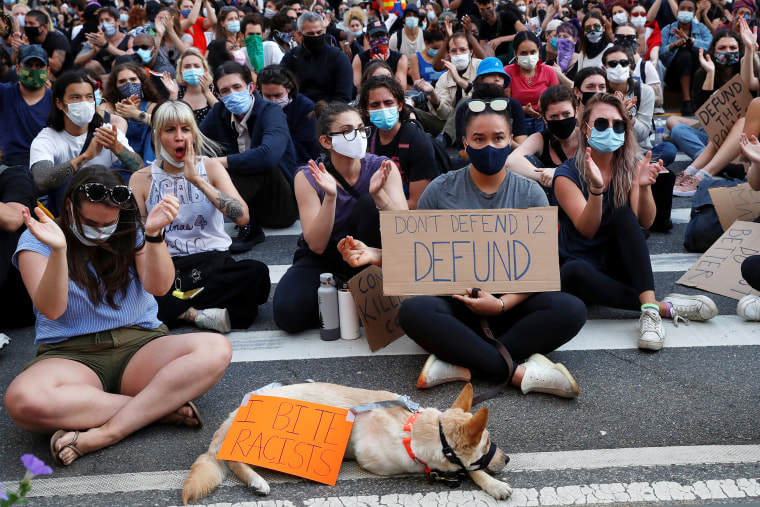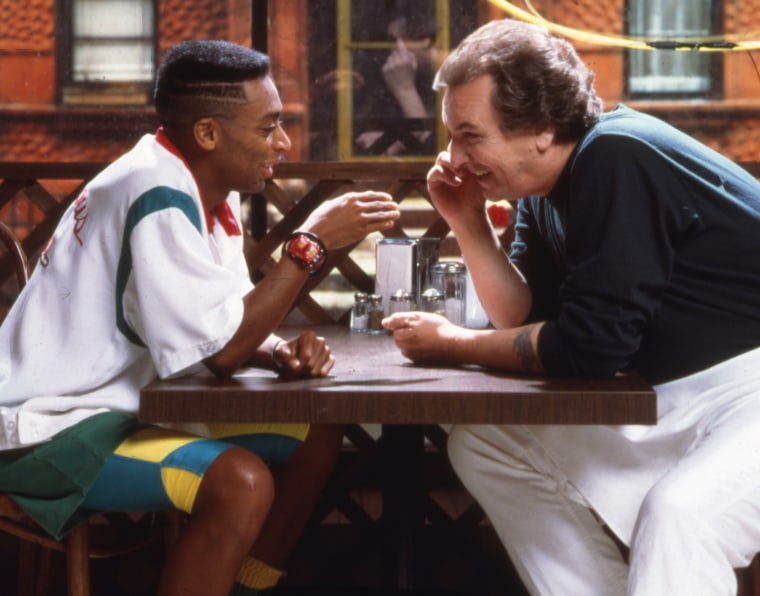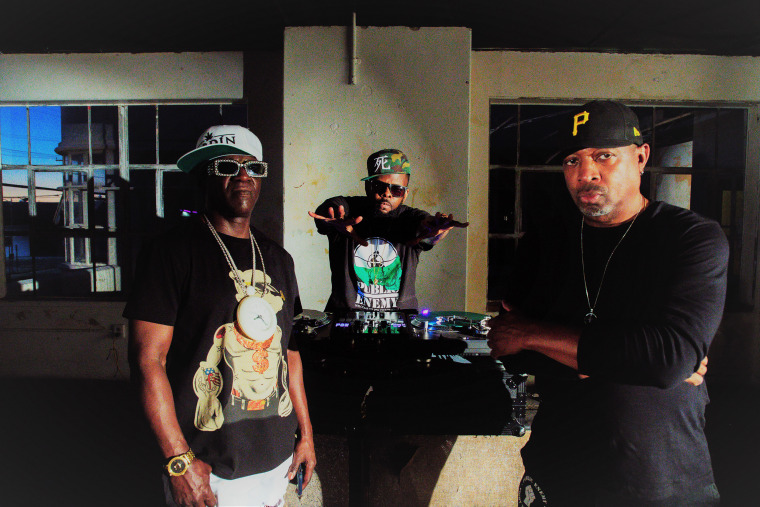The nation of millions that held them back may now be listening.
Public Enemy has been rapping for four decades about systemic racism and police brutality, issues at the heart of the Black Lives Matter movement that has grown across the United States in the weeks since George Floyd's death in Minneapolis police custody. Even if many protesters weren't yet born when "Fight the Power" entered the national consciousness with the release of director Spike Lee's movie, "Do the Right Thing," on June 30, 1989, the echoes from the song still reverberate.
Before these diverse mass protests, a previous generation heard Public Enemy, and contemporaries such as N.W.A. and Ice-T, rap about Black life in America's cities. Their words reached all the way to stereos in white suburbia and opened at least some people's ears in the process.
"At the stage and age that myself and Flavor Flav and the crew are at, I enjoy this period so much of being in my lane and seeing so many of the younger voices step up," group leader Chuck D, 59, told NBC News this week. "When someone is 60 years old, you ask them for advice, you don’t ask them for leadership."
Many of those younger voices he referred to seem to know the lyrics to "Fight the Power" by heart. The song title is a fixture both on signs at the demonstrations and Spotify playlists of protest music making the rounds.
"Protest movements, particularly ones that are sustained over a long period of time look for anthems," said Mark Anthony Neal, chairman of the Department of African & African American Studies at Duke University.
"So, it's not surprising that for this generation, even going back to some of the early Black Lives Matter protests in Ferguson in 2014, that one of the things that has resonated for them were some of the anti-police, pro-black, hip-hop songs from the late '80s and early '90s," said Neal. "Everybody knew 'Fight the Power,' everybody knew (N.W.A.'s) 'F--k the Police.'"
Public Enemy, which includes hypeman Flavor Flav and turntablist DJ Lord, fights on. On Friday, the group dropped a new single and video, "State of the Union (STFU)," which skewers President Donald Trump. The video features the infamous footage of Minneapolis police officer Derek Chauvin kneeling on Floyd's neck, a chain of events that Chuck D says is an extension of the tone set by the White House.
"The administration of the last four years have been specialists in weapons of mass distraction, whippings of mass distraction," said Chuck D. "They whip up this hyperbole and swirl it up and people get caught up in this, that, or whatever. The murder of George Floyd was the tipping point."

That footage seems eerily familiar to viewers who remember well the climax of "Do the Right Thing."
The police chokehold that kills Radio Raheem (Bill Nunn) in the movie — the resulting fallout from the young Black man's loudly playing Public Enemy no less on his boombox at the local white-owned pizzeria — may have been fictional, but Lee was inspired by the similar real-life death of New York graffiti artist Michael Stewart in 1983.
"I will say that if you see 'Do the Right Thing,' it’s hard not to think of Eric Garner and George Floyd," said Lee. "(It's timeless) and that’s a goddamn shame."
During filming, actor Nunn carried a silent portable stereo, with Lee planning on subbing in the music in post-production — once he had the right song.
"I wanted an anthem," recalled Lee. "Growing up in New York, there’s always one song that, no matter what, is the song of the summer. Coming out of someone’s brownstone or bodega or a boom box, there's always one song.
"I knew the movie was coming out in the Summer of '89, so I wanted the song that Radio Raheem was playing to be the song of the summer," he said. He approached Public Enemy, already established by then as the provocateurs of the rap genre.
"Well, it was the second 'Fight the Power,' bro," said Chuck D, referring to the 1975 Isley Brothers tune of the same name that jarred him when he first heard it as a 15-year-old. "Once I figured that out, it was something we felt we could build on. It was something that resonated in my headbecause it was the first record I heard with a curse word."
His version of "Fight the Power" used snippets of speeches by leaders of the civil rights movement, samples of James Brown's music and a seismic beat to reinforce the power behind rhymes attacking racial disparities in America. The track sounds like a call to arms; it's not an accident that Lee staged a protest march with hundreds of extras when he directed the music video for the song rather, than opting for more traditional concert footage.
Longtime music journalist Cheo Hodari Coker said that for many young Black males of that era, himself included, the songs on Public Enemy's albums led to an expansion of racial consciousness.
"You get to the '80s and it was almost like in this progressive way, everybody tried to forget what happened during the civil rights movement," said Coker, who recently was the showrunner on Marvel's "Luke Cage" series.
"Public Enemy, they sent to you to the bookstore just as easily as they sent you to the dance floor. Having knowledge of one's blackness was as now important as being cool," he said.
Simultaneously, though, the music was also reaching far beyond its initial intended audience — to white record buyers. Public Enemy would go on to record a popular new version of their song, "Bring the Noise," with the heavy metal band Anthrax. Many of those fans also flocked to the multiplex to see cinematic depictions of the very issues that were being rapped about, courtesy of films such as "Do the Right Thing" and John Singleton's 1991 drama, "Boyz N the Hood."

"It was the combination of hip hop and Black cinema," said Coker. "The fact that you could, from the safety of suburbia, have all these visual and audio experiences began to influence the way that people see that world.
"Who is to say it doesn't have an impact? Who's to say they can't come to understand things that the previous generation could never understand?" he said.
Just how many were actually listening to the lyrics is hard to quantify. Members of Rage Against the Machine lashed out at then-Speaker of the House Paul Ryan in 2012 when he listed the protest metal band as his favorite group. Guitarist Tom Morello said the Republican politician was part of the very political machine they were raging against.
Neal said that by the time Barack Obama ran for the presidency in 2008, there was enough of a change in understanding that the idea of a Black president "was something that wasn't unfamiliar" to whites who had been listening to this music for almost 20 years.
"I think what we're seeing now in many ways is kind of the children of that generation who were first listening to all those anthems of Black resistance," said Neal of the current protesters.
Lee set out to commission the song of the summer of 1989; the result proved more timeless. "Fight the Power" was named No. 1 on Time Out magazine's list of "Top 100 Songs that Changed the World," bolstered in part by its use by rebels against the Slobodan Milošević’s Serbian regime in 1991.
"I don’t know if 'Fight the Power' got past number 10 on any chart ever, I don’t know if 'Fight the Power' sold more than any other rap record' it’s not even in the top 100 of records ever sold," said Chuck D.
"But it is the most important rap record of all time," he said.
